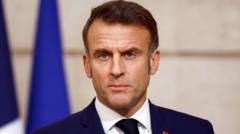Macron engaged in talks with various political leaders, including Socialists who appear open to a "fixed-term" government. Socialist leader Olivier Faure signaled a willingness to compromise, although he also expressed reluctance to support continuity of Macron's policies. With the National Assembly now divided among the left, centre, and far right, the president faces challenges in selecting a prime minister who will gain parliamentary support.
Despite the turmoil, Macron emphasized his own accountability for past decisions, particularly the snap elections that resulted in legislative stalemate. He did not reveal potential candidates for the new prime minister but mentioned that budgetary matters would be a priority. As world leaders prepare for the reopening of Notre-Dame Cathedral, the political landscape remains uncertain, with Barnier's resignation serving as a catalyst for broader discussions around governance in France. Speculation surrounds potential candidates, including Defence Minister Sébastien Lecornu and former presidential candidate François Bayrou, with time running short before international events unfold in Paris.
Despite the turmoil, Macron emphasized his own accountability for past decisions, particularly the snap elections that resulted in legislative stalemate. He did not reveal potential candidates for the new prime minister but mentioned that budgetary matters would be a priority. As world leaders prepare for the reopening of Notre-Dame Cathedral, the political landscape remains uncertain, with Barnier's resignation serving as a catalyst for broader discussions around governance in France. Speculation surrounds potential candidates, including Defence Minister Sébastien Lecornu and former presidential candidate François Bayrou, with time running short before international events unfold in Paris.




















